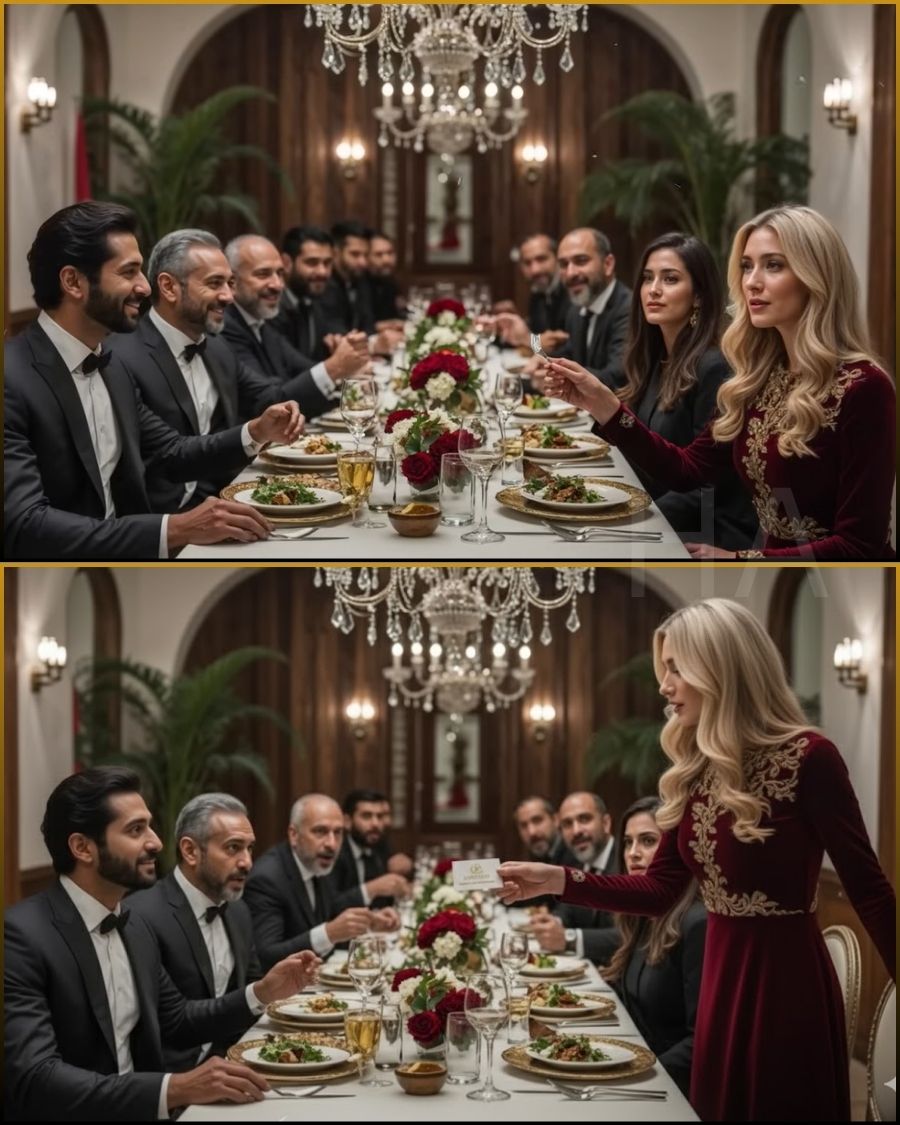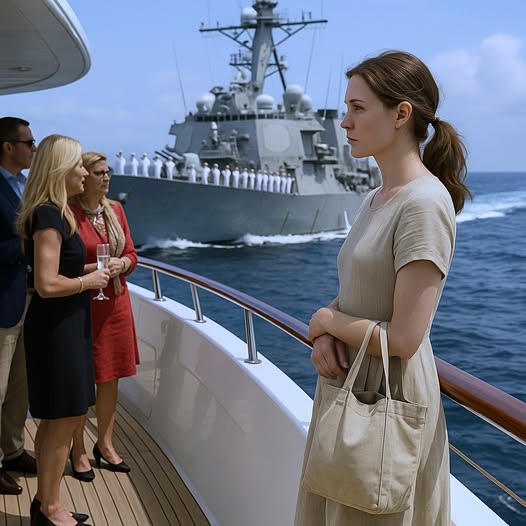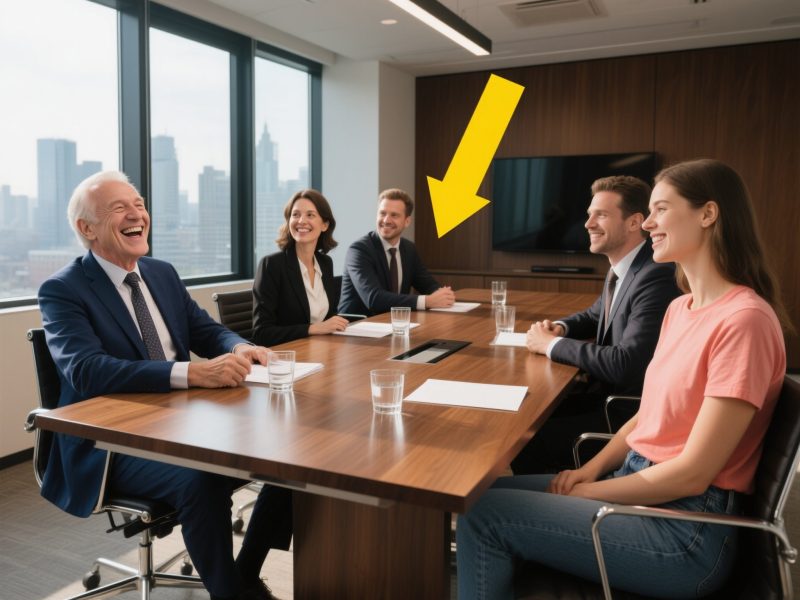The Silent Game
The laughing in the private dining area of the Damascus Rose Restaurant sounded like crystal. I sat quietly, my fork over the untouched lamb, and watched twelve members of the Almanzor family chat in fast Arabic that poured over me like water over rocks. I was told that I didn’t understand a word.
My fiancé, Tariq, sat at the head of the table with his hand on my shoulder, not translating anything. Leila, his mother, regarded me with the eyes of a falcon and the slight smile of a woman who already knew how it would end.
Tariq said to his brother in Arabic, with a giggle in his voice, “She doesn’t even know how to make coffee.” “She used a machine yesterday.”
Omar
almost choked on his wine. “A machine? “You’re going to marry that?”
I took a sip of water and kept my face calm. I had been wearing the same mask for six months since Tariq asked me to marry him. They believed I was the dumb American girl who couldn’t understand what they were saying. They were wrong.
When Tariq got close, I smiled softly. “Habibti, my mother says you look beautiful tonight.”
Leila had just told me that my dress made me appear cheap. I still thanked him.
Hassan, Tariq’s father, raised his glass. His daughter said in Arabic, “New problems” and “To family—and to new beginnings.” More fun. Tariq added, “The kind who doesn’t even know she’s being insulted.”
I laughed along and wrote down everything they said.
I looked at my phone in the bathroom. James Chen, the chief of my father’s security section, sent me a note. Transcribed and translated audio from the last three family dinners. Your dad wants to know if you’re ready.
I typed, “Not yet.” First, I need recordings of business meetings.
Eight years ago, I was Sophie Martinez, a naive recent graduate who had just started working for my father’s consulting firm in Dubai. I had mastered Arabic and studied culture till it became second nature. When I went back to Boston as COO, I could bargain in Classical Arabic better than most native speakers.
Then Tariq Al-Mansur showed up there. He was good-looking, went to Harvard, and was the heir to a large Saudi business. The perfect way for my father’s business to go into a market it could never fully get into. That’s what I thought.
He wooed me with studied charm and asked me to marry him within a few months. I said yes, but not because I loved him. I didn’t know then that he had picked me for reasons that were colder than my own.
The first family supper had shown everything. They made fun of my clothes, my job, and even my ability to have children, all in Arabic. Tariq had laughed with them and called me “too American” and “too independent.” I had smiled pleasantly and acted confused, then gone home to make a list of all the insults.
Two months later, I knew what they were really up to. Tariq’s organization was working with our greatest rival, Blackstone Consulting, to steal Martinez Global’s customer lists and plans. He took advantage of our relationship, sure I wouldn’t notice since I was too dumb.
He never knew I was recording everything using altered jewelry—his own gifts, which my father’s tech team had changed.
He will meet with Qatari investors tomorrow to show them stolen material. He felt that would make him untouchable. Instead, it would wreck him.
Dinner took a long time. Leila asked me questions regarding my job. “Will you still work after you get married?”
I looked at Tariq. “We’ll make the decision together.”
She added, “A wife’s first duty is to her family.” “Men should work.”
“Of course,” I said softly. “Family comes first.”
Everyone calmed down. No one knew I had already signed a ten-year deal as an executive.
When supper was over, Tariq drove me home, beaming with pride. “You were perfect. They care about you.
“Really?” I asked.
“Of course. My mom says you’re kind and polite.
He kissed my hand. I smiled. “That means a lot.”
I opened the transcript for the night and poured some wine after he left. One line made me halt in my tracks:
Tariq told his father, “Sophie tells me everything.” “She thinks she’s impressing me with how smart she is about business.” She doesn’t know that what she’s giving me will help us beat their bid.
But I had never told him about our contracts in Qatar or Abu Dhabi. That implied there was a spy inside Martinez Global.
James confirmed it: Richard Torres, my father’s longtime VP in Dubai, was a mentor, a coworker, and a traitor. In the morning, we would face him.
I walked into my dad’s office at 7:45 a.m. with two cups of coffee. He was already going over the evidence: bank transfers, emails, and every betrayal listed. Richard came in with a smile, but when he saw the folder, he became pale.
“I was in a lot of debt,” he begged. “They offered money.” I didn’t think—
“You thought enough to sell trade secrets,” Patricia Chen from Legal said.
My dad told him he could either quit, confess, and work with the police, or he could go to jail. Richard signed each sheet, his hands shaking.
My dad looked at me when he departed. “Are you ready for Tariq’s meeting?”
“More than ready.”
Tariq called that afternoon. “Big investors want to meet in person.” Habibti, come with me. “They care about family.”
“Of course,” I answered.
He picked me up around 1:30, full of himself. He fixed his tie in the elevator to the top floor of the hotel. “From now on, Almanzor Holdings will rule the Gulf market.”
I asked, “How?”
“By taking what others don’t deserve.” “The strong survive.”
He had no notion that there was a trap waiting for him upstairs.
Sheikh Abdullah Al-Thani, one of the Gulf’s most respected investors, two Qatari officials, and my father were all in the executive suite.
Tariq stopped. “I don’t… get it.”
Sheikh Abdullah replied coldly, “This was your chance to show off stolen strategies.” “Instead, it’s your time to pay.”
He put papers on the table: Richard Torres’s confession, bank statements, and transcripts of our dinners. “Did you know she understood everything you said?”
Tariq’s eyes met mine, and I realized what was going on.
I then talked in perfect Arabic. “You wanted to know what this meeting is for? It’s about fairness. About what occurs when you don’t give enough credit to the individuals you try to scam.
He sat down in his chair.
The Sheikh went on. “Your activities break the law of international business. Tomorrow, every big investor will know what you tried to do.
“My family—please, they didn’t know—”
The Sheikh added, “They made fun of her with you.” “They are ashamed of you.”
My father’s voice sounded like quiet steel. “You’ll have to give a complete account of every document you stole and every person you talked to at Blackstone. You will testify under oath. And you won’t see my daughter.
Tariq nodded without thinking.
I took one last look at him. “You asked me once why I worked so hard. Because I never wanted to have to rely on someone like you.
The end of the conference was silent. Tariq stayed behind to make his statement.
The fallout had started by the end of the day. Sheikh Abdullah’s administration said in a statement that they were cutting all relations with the Almanzors because they did not meet our standards of honesty. Their contracts fell apart in a matter of hours.
Richard fully cooperated, and he didn’t get charged with a crime, but his career was over. Blackstone quickly tried to separate itself by giving us documents to support our claim.
Leila was really angry when she called me. “You will meet with me. We need to figure this out.
I said in Arabic, “In my world, Mrs. Almanzor, we call it fraud.” “And we go after it.”
Her gasp broke the connection. “Do you speak Arabic?”
I said, “All this time,” and then I hung up.
Three days later, Martinez Global got a settlement offer: the full $200 million plus the cost of the lawsuit. We accepted.
The win wasn’t just about money; it was also about morals. The story circulated quietly among people around the world, serving as a caution not to confuse silence with ignorance.
A week later, a courier sent a handwritten note from Tariq.
You were correct. I took advantage of you. I made fun of you. I told myself it was just work. I made a mistake. My family has lost it all. I’m leaving Boston now. I don’t expect forgiveness, but I want you to know you beat me at my own game. You were always smarter than I thought you were.
I took a picture of the letter for the record and then tore it up. Always keep records.
Three weeks later, I went back to the Damascus Rose restaurant. The chandeliers were the same, but the people were changed. Sheikh Abdullah threw a dinner to honor justice and working together.
He raised a glass to “Sophie Martinez,” toggling between Arabic and English, and said, “Who reminded us never to underestimate a quiet woman?”
The room was full of laughter.
He pulled me aside later. “My daughter goes to Oxford to study business.” She wants to be like you.
I smiled. “Then the future is in good hands.”
While driving home through the Boston lights, I thought about everything: the dinners, the insults, the treachery, and the lesson. A last message flashed on my phone.
This is Amira. I apologize for how we handled you. I learned more from watching my family fall apart than I ever did from being proud. Please don’t answer.
I didn’t. But I kept it. Some lessons leave scars that are deep enough to change people.
The engagement ring was kept away, a sign of pride and bad judgment. One day I would sell it and provide the money to women who want to establish their own businesses. It stayed as a reminder for now: being quiet doesn’t mean you’re weak; being patient means you’re strong.
Eight years in Dubai had taught me the language of strategy, but this experience had taught me something even more important: the long game, the virtue of forbearance, and the strength that comes from being underestimated.
I poured myself a glass of wine and stared out over the city. I would finish our new Qatar expansion tomorrow. In a month, I would be the Executive Vice President of Global Operations.
I let myself have one private toast tonight.
Two things we’ve learned. To victories that are silent.
To fresh starts.
The words in Arabic felt like they were mine.


